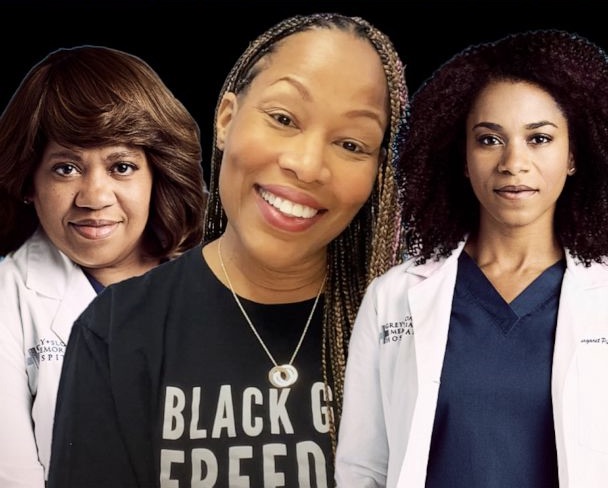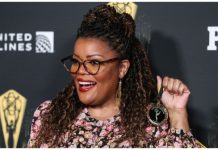
*In the waning days of Black History Month last week, “Good Morning America” gathered “Grey’s Anatomy” stars Chandra Wilson (Dr. Miranda Bailey) and Kelly McCreary (Dr. Maggie Pierce) as well as Zoanne Clark — a doctor, writer and executive producer who has been with “Grey’s Anatomy” since the pilot — for a wide-ranging chat conducted over Zoom.
Topics included how they navigate their lives as Black women, how they believe Hollywood is changing for the better, how they deal with their “complicated” relationship to the United States and what gives them hope for the future.
Via ABC News:
Clack noted how Dr. Miranda Bailey was the only character given a race and description in the “Grey’s Anatomy” pilot, having first been described as “a tiny blonde with curls who was underestimated.” She remembered how Wilson ultimately “stole the role” with her audition, which led to changes to the character.
This led to Wilson acknowledging how she had been treated in castings prior to her booking this career-defining role, which she has portrayed since 2005.
“I wasn’t (an) ingénue; I didn’t have whatever that look was, and casting always likes to give you a type,” she said. “I was always the thing that they called ‘non-traditional casting,’ so I would just go in for anything and just say, ‘I know that the role says this, but let me show you how I would do this,’ and see if that’s OK.”
“That’s always been the case for me. I already knew I didn’t fit in, so I just never cared,” Wilson added. “I was just like, ‘I know you’re looking for her, but here, how about this.'”
McCreary, who has played Dr. Maggie Pierce, a mixed-race woman, since joining the show in late season 10, acknowledged her own “light-skinned privilege” for having booked numerous roles in her career.
“I’m Black; both of my parents are Black. I am the light-skinned one in my family and everyone else in my family has a darker complexion than I do,” she said, explaining the “weird anomaly” of her career that most of the auditions she gets are for biracial women despite her not being one herself.
“So I’m a Black woman and, because of my complexion, I was mostly going in to play mixed girls. These are roles that I wouldn’t have been able to audition for and book, possibly, if my complexion had been darker,” McCreary elaborated. “That’s my light-skinned privilege.”
While the current “Grey’s Anatomy” season has focused largely on COVID-19, the powers that be behind the show have taken it further by specifically addressing its impact on the Black community. Perhaps one of the most powerful scenes thus far was in season 17’s fifth episode, with Wilson and McCreary’s characters having a candid chat on a park bench.
Wilson said that because of the subject matter and them being a “vehicle for people to grieve at that time” amid the global pandemic, as evidenced by Dr. Bailey talking about her mother, who has Alzheimer’s and resides in a nursing home. Being both elderly and Black, her mom falls within two communities hit hard by the virus.
“We hadn’t had a national day of mourning yet, we hadn’t had a national acknowledgement of the losses that have been occurring during the pandemic,” she explained. “So I understood the need to facilitate that and to be able to give a conversation to our audiences that maybe they aren’t having, that they don’t know. That as Black women, as Black children, as Black physicians these are conversations that we have.”
McCreary, on the other hand, looked at the scene as a moment between two Black women simply connecting on another level.
“I’ve been thinking a lot about how Maggie was a prodigy, and she was very likely — not necessarily, but very likely — one of the only or one of the few Black girls, kids, people in almost every scenario she was in growing up,” she suggested. “When I think about my upbringing, that was true, too. I think a lot about having been identified as a young, gifted, Black talented kid, and how I was sort of separated and isolated.”
Watch the full video of the conversation below:
We Publish News 24/7. Don’t Miss A Story. Click HERE to SUBSCRIBE to Our Newsletter Now!





